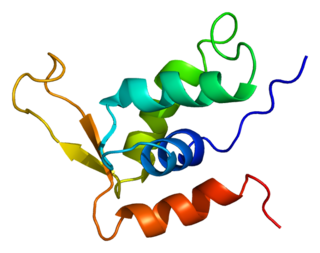
Chromobox protein homolog 3 is a protein that is encoded by the CBX3 gene in humans.

Nucleolar transcription factor 1 is a protein that in humans is encoded by the UBTF gene.

Nucleolar phosphoprotein p130 is a protein that in humans is encoded by the NOLC1 gene.

Ras GTPase-activating protein-binding protein 1 is an enzyme that in humans is encoded by the G3BP1 gene.

Docking protein 2 is a protein that in humans is encoded by the DOK2 gene.

Ena/VASP-like protein is a member of the Ena/VASP family of proteins that in humans is encoded by the EVL gene.

Myb-binding protein 1A is a protein that in humans is encoded by the MYBBP1A gene.

Nuclear factor 1 C-type is a protein that in humans is encoded by the NFIC gene.

DNA-binding protein A is a protein that in humans is encoded by the CSDA gene.

Ribosomal L1 domain-containing protein 1 is a protein that in humans is encoded by the RSL1D1 gene.

LIM and SH3 domain protein 1 is a protein that in humans is encoded by the LASP1 gene.

Zinc finger and BTB domain-containing protein 7A is a protein that in humans is encoded by the ZBTB7A gene.

Zinc finger protein 638 is a protein that in humans is encoded by the ZNF638 gene.

ATP-binding cassette sub-family F member 1 is a protein that in humans is encoded by the ABCF1 gene.

Forkhead box protein K2 is a protein that in humans is encoded by the FOXK2 gene.

EH-domain containing 2, also known as EHD2, is a human gene belonging to the EHD protein family.

U3 small nucleolar ribonucleoprotein protein MPP10 is a protein that in humans is encoded by the MPHOSPH10 gene.

ESF1 homolog is a protein that in humans is encoded by the ESF1 gene.

Nucleolar GTP-binding protein 2 is a protein that in humans is encoded by the GNL2 gene.

Transcription initiation factor TFIID subunit 3 is a protein that in humans is encoded by the TAF3 gene.
























